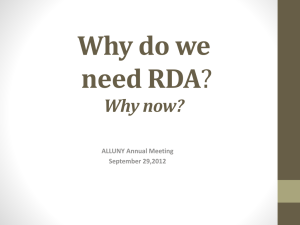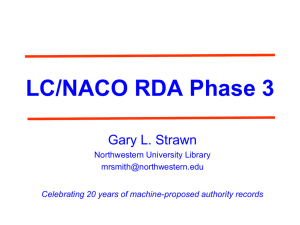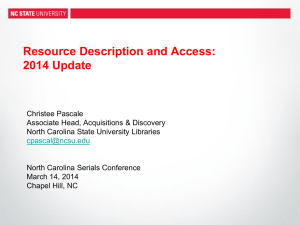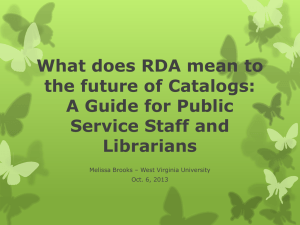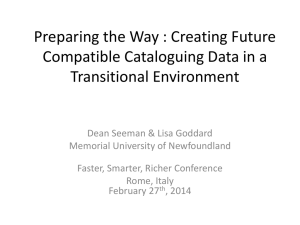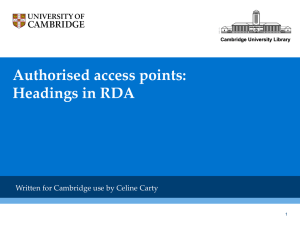BCLA2012_presentation_LW_may10_distribution
advertisement
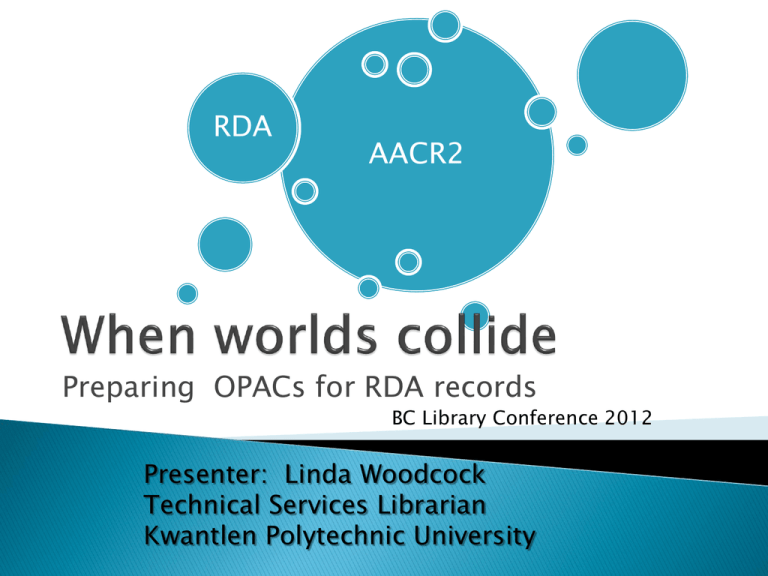
RDA AACR2 Preparing OPACs for RDA records BC Library Conference 2012 Presenter: Linda Woodcock Technical Services Librarian Kwantlen Polytechnic University IT’S OFFICIAL! RDA WILL LAUNCH MARCH 2013 June 2012 LC catalogers begin training June 2012 NACO RDA training begins September 2012 – ◦ a pool of 50-60 LC cataloguers will be working with RDA March 31st, 2013 March 31st, 2013 ◦ Library of Congress fully implements RDA ◦ PCC Day One for RDA Authorities on all records AACR2 Published 1978, adopted 1981 Online catalogues were still in their infancy Severe economic constraints facing libraries Limited acceptance at outset in library community Possibility of closing card catalogues to facilitate adoption of new code RDA Published 2010, adopted 2013 Clear successor to MARC has not emerged Severe economic constraints facing libraries Limited acceptance at outset in library community Some movement away from local catalogues to hosted/shared solutions “The preeminent cataloger, Seymour Lubetzky, called AACR2 “inconsistent with the traditions of AngloAmerican cataloging, a misguided effort.” American Libraries, June 1980 “AACR2 – why is it being adopted? It will only cost libraries money…” American Libraries editorial, July 1980 “… the practical result of their theoretical approach promises to be the biggest disaster to hit descriptive cataloguing since the draft rules of 1941 …” Michael Gorman 2007 Too many options will mean less consistency No comprehensive study of end-users had taken place Library administrators were not consulted Automated systems were still in their infancy Massive revisions to authority files needed Lack of authority control in local catalogues Benefits unclear Too expensive too implement Too many options for application of standard will reduce consistency and impair shared cataloguing Abandoning ISBD will mean no display standard Systems cannot act on any of the new data elements MARC replacement not ready Benefits to end-user seem minor or a long way off Smaller libraries cannot afford to adopt Transition to a new code takes time Not all libraries will adopt on same timeline Hybrid records can create confusion around changes to the rules Authority files must be fully converted to new code Update MARC 21 formats in ILS Determine current role of gmd in limiting & displays Decide on display and indexing of new fields Set local policy for RDA Core element set Set local policy for RDA alternatives and options Decide on handling of authority record creation and authority processing options Create policies for editing AACR2 records Train staff on FRBR model Train staff on RDA GMD vs Content type, Media type, Carrier type Relationship designators in $e, $i Few abbreviations, new transcription conventions Data elements moved to discrete fields ◦ 380 Form of work, 382 medium of performance New fields in authority records – 623 field of activity, 624 affiliation, 625 occupation New format codes in fixed fields Change to authority heading structure for Bible and Qu’ran, some personal names, treaties, uniform titles =LDR 01004nam a2200313Ii 4500 =001 ocn669167862 =003 OCoLC TEXT =005 20110113033851.0 =008 101008s2010\\\\nyua\\\\\\\\\\000\0\eng\d =010 \\$a 2009937080 =040 \\$aCGU$beng$cCGU$erda =020 \\$a9781598530667 =020 \\$a1598530666 =035 \\$a(OCoLC)669167862 =079 \\$aocn664723769 =049 \\$aDLCC =100 1\$aTwain, Mark,$eauthor. =240 10$aTravel writings.$kSelections =245 12$aA tramp abroad, Following the equator, other travels /$cMark Twain ; Roy Blount, Jr., editor. =260 \\$aNew York :$bLibrary of America,$c[2010], ©2010. =300 \\$a1145 pages :$billustrations ;$c21 cm =336 \\$atext$2rdacontent =337 \\$aunmediated$2rdamedia =338 \\$avolume$2rdacarrier =700 1\$aBlount, Roy,$cJr.,$eeditor. =700 12$iContains (work):$aTwain, Mark.$tTramp abroad. =700 12$iContains (work):$aTwain, Mark.$tFollowing the equator. =110 2\$aRattletrap (Musical group) MUSIC CD =245 10$aRattletrap =260 \\$a[New Hampshire] :$bRattletrap,$c[2003], ©2003 =300 \\$a1 sound disc :$bdigital ;$c4 3/4 in =336 \\$aperformed music$2rdacontent =337 \\$aaudio$2rdamedia =338 \\$aaudio disc$2rdacarrier =500 \\$aTitle from CD case =505 0\$a1. Movin-on. -- 2. Change. -- 3. Devil. -- 4. Pepper grind. -- 5. Rainy-day =511 0\$aTom Matthews, vocals ; Jeremy Dominick, guitar ; Jim Chabot, bass ; Grant Houle, drums =518 \\$a"All songs written and produced by Rattletrap at Dizzyland Recording, Inc. [Rochester, New Hampshire]"--Back of CD case =700 1\$aMathews, Tom,$esinger =700 1\$aDominick, Jeremy,$einstrumentalist =700 1\$aChabot, Jim,$einstrumentalist =700 1\$aHoule, Grant,$einstrumentalist =710 2\$aDizzyland Recording,$erecording studio =LDR 02560ngm a2200493Ki 4500 =001 ocn697800462 VIDEO DVD =003 OCoLC =005 20110201055509.0 =007 vd\csaizq =008 110121s2007\\\\cau080\\\\\\\\\\\\vleng\d =040 \\$aOCLCQ$beng$erda$cQBX$dOCLCQ$dUTV =020 \\$a9781419850578 =020 \\$a1419850571 =024 1\$a085391145530 =028 42$a114553$bWarner Bros. =035 \\$a(OCoLC)697800462 =041 0\$aeng$aspa$jeng$jspa =079 \\$aocn664731803 =245 00$aMarch of the penguins. =260 \\$aBurbank, CA :$bDistributed by Warner Home Video,$c[2007], copyright 2007. =300 \\$a1 videodisc :$bsound, color ;$c4 3/4 in. =336 \\$atwo-dimensional moving image$2rdacontent =337 \\$avideo$2rdamedia =338 \\$avideodisc$2rdacarrier Goals of RDA included compatibility with legacy records Massive global changes to AACR2 records should not be necessary Key issues will be ◦ Preserving integrity of search and display for format ◦ compatibility of AACR2 headings with RDA forms Consistency – for input, for end user Consistency - across the database for searching, limiting, faceting Clear displays of new data elements Guidelines for editing RDA records until RDA adopted Guidelines for editing AACR2 records once RDA adopted Ability to automate desired changes PCC RDA-Decisions-Needed Task Group: Final report (Sept. 15, 2011) Task Group on Hybrid Bibliographic Records: Final report (Sept. 1, 2011) Task Group on AACR2 & RDA Acceptable Heading Categories: Final report (Sept. 1, 2011) PCC Day One for RDA Authority Records Watch for more guidance from this group! (December 20, 2011, updated March 23, 2012) Policy on Hybrid Records – Interim period PCC recommends that AACR2 PCC records generally not be re-cataloged to RDA If record is to be converted to RDA all elements must be evaluated and the resulting record coded as RDA Have published guidelines for editing records in various formats These guidelines are only for interim period and may be changed post March 2013 Do not mix AACR2 and RDA conventions within the body of the description Do add new RDA elements to aid retrieval and build consistency into the future Add elements that will improve access just as we do now Avoid removing data that could be useful in the future – suppress it instead If re-coding to RDA evaluate every field and heading What is possible What is practical What is absolutely necessary What type of in-house expertise do you have? Can you afford to send your records out for revision? Do you receive updated records via authorities processing? A. B. C. New records in RDA; existing records left alone New records in RDA; minor modifications to existing records New records in RDA; major modifications to existing records A. New records in RDA; existing records left alone. • RDA records with 3XX tags, majority with gmd • RDA records with relationship designators; majority of AACR2 records will not • RDA records will have few abbreviations, AACR2 records will contain standard abbreviations B. New records in RDA; some modifications to legacy AACR2 records • RDA records with 3XX tags • Modify AACR2 records to add 3XX tags; suppress or remove gmd • RDA records with relationship designators • Add designators to AACR2 records if editing for other reasons • RDA records will have fewer abbreviations • Leave as is C. New records in RDA; major changes to bring existing records to RDA-like state. • RDA records with 3XX tags, add 3XX tags to legacy records • Convert standard abbreviations to spelled out forms • Convert Latin abbreviations to spelled out forms • Migrate standard form notes to new 38X tags Incorporating RDA practices into WorldCat A Discussion Paper http://www.oclc.org/rda/discussion.htm • Proposing to modify AACR2 records to bring as close as possible to RDA records • Rationale: • Legacy records need to made as functional as possible in future RDA environment • cataloguers would not need to know both sets of rules when working with legacy records • Treating various records differently would require additional program logic Proposed policy Will develop programming to ◦ add 336, 337, 338 fields to all records and remove subfield $h; ◦ convert abbreviations in non-transcribed elements to spelled out forms ◦ convert Latin abbreviations to spelled out non-Latin forms Catalogers may recatalog items as RDA & add the designation in 040 $e rda Catalogers may update individual fields in pre-RDA records to reflect RDA practice – the record would retain the indication of the rules under which it was initially cataloged Let it go - suppress from display or remove Move it Move 336-337 into GMD position Aid the user by making use of common terms in 300 ◦ 1 DVD ◦ 1 CD IMPACT on end user? Does ILS uses gmd for limiting? Can ILS use fixed field coding and/or item types for limiting? Is there clear indication of format on summary displays and full displays? Summon WorldCat Local BiblioCommons Amazon Leave them alone Make global changes ◦ CAUTION May wish to restrict to non-transcribed fields AACR2 transcribed fields could include abbreviations that were found on the piece RDA directs to transcribe as found; in some instances this would be an abbreviated form Going forward it could become difficult to conclude you were looking at the same edition as the one catalogued Add them wherever and whenever possible Internet Movie Database demonstrates the value of this effort During transition – ◦ index but do not display until significant percentage of records contain them ◦ Display could break up collocation in browse lists ◦ Display in full record but not in browse lists As of March 31, 2013 all headings must be in RDA form LC plans to convert the entire Name Authority File to RDA PCC Acceptable Headings Implementation Task Group Phased conversion of the LC/NACO authority file to RDA – paper Final report of the PCC Task Group on AACR2 & RDA Acceptable Heading Categories points out that the vast majority of existing AACR2 authority records are acceptable as RDA authority records. Vast majority – 95% are AACR2 authority records whose 1XX field can be used under RDA Two much smaller categories of existing AACR2 records will require machine or human manipulation to make them RDA acceptable. The Final report of the PCC Task Group on AACR2 & RDA Acceptable Heading Categories identifies three categories of existing headings: Headings that are acceptable under RDA and can be used as-is 7,631,000 Headings that contain elements not provided for under RDA. These must be evaluated and changed manually. 225,000 Headings that will be usable under RDA after some batch operations are performed by machine. 172,000 Before PCC “Day One” for RDA Authority Records, March 31, 2013, all three categories of AACR2 headings identified in the Final report of the PCC Task Group on AACR2 & RDA Acceptable Heading Categories may be used in either RDA or AACR2 records. After “Day One”, March 31, 2013, catalogers will need to manually evaluate and recode the category of AACR2 records that are not RDA acceptable as is and can’t be converted by machine processing. April 25, 2012 - PCC Policy Committee supported the recommendation of the PCC Acceptable Headings Implementation Task Group to proceed with Alternate Scenario 3 for the redistribution of records in the LC/NACO Authority File in preparation for PCC Day One for Authority Records, March 31, 2012. Consists of two phases 1. Records whose 1XX is not suitable for use under RDA without review and are not susceptible to RDA-related mechanical change are reissued with identifying 667 field 2. Records containing a field susceptible to an RDArelated mechanical change are reissued as close to Day 1 as possible Records whose 1XX is suitable for use under RDA will not be re-coded as RDA at this time Authorities Processing Vendors are offering customers options around RDA headings Backstage Library Works New Marc Authority Record planning guide offers customers several options for controlling the influx of RDA headings Can choose NOT to receive RDA headings Can choose to receive RDA headings only if new 7 different scenarios for matching headings to either AACR2 or RDA forms Library Technologies, Inc. As of September 2011 has offered the option to receive RDA forms or to remain with AACR2 forms only MarcEdit – Terry Reese is working on adding routines to MarcEdit that will assist libraries in making global edits to add RDA elements to bibliographic records or the reverse Move data upstream – abandon local OPAC in favour of hosted services SirsiDynix ◦ Symphony ◦ Horizon Innovative Voyageur Interviewed by RDA Toolkit publisher ◦ Most replied that they are current with MARC 21 changes and the systems can display new RDA fields ◦ III : Considering options for filtering and faceting that will leverage increased granularity of RDA fields ◦ Version 8 of Voyageur includes a module for making global data changes What have you heard from your vendors? Strong message must be sent requiring their action on utilizing new RDA elements and assisting with conversion of legacy records where and when appropriate New MARC fields and subfields have been incorporated in the latest release ◦ More changes will come in next service pack No solutions offered for converting legacy data Opportunity to participate in a development team to study changes needed for optimal use of new RDA elements We will be operating in a mixed environment for some time We should ask our ILS vendors for support to convert our databases We will need to press ILS vendors for innovative implementations of the FRBR model and RDA linking relationships
